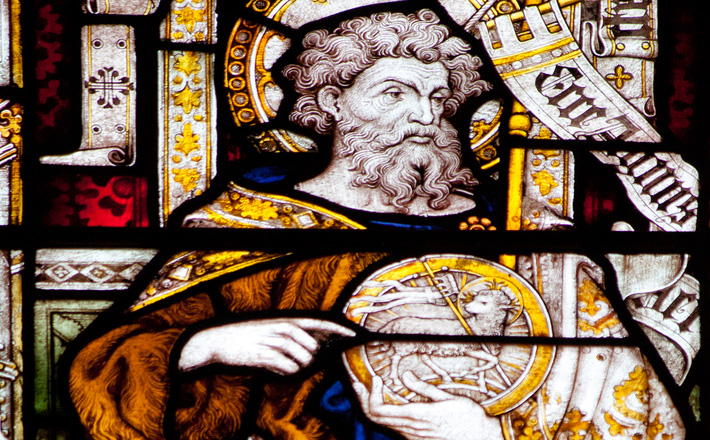Commentary on Isaiah 49:1-7
Soren Kierkegaard famously has said: “The door to happiness opens outward.”
Something of this life in service of others is evident in our lectionary text for today that forms part of what traditionally has been called the Servant Songs. Together with Isaiah 42:1-7, Isaiah 50:4-9, and Isaiah 52:13-53:12, Isaiah 49:1-7 speaks of the Servant of God who is called to be a light to the nations; a source of salvation (Isaiah 49:6) to bring justice to those who are entrapped in situations of oppression: the poor, the needy, the imprisoned (Isaiah 42:6-7).
For a long time, the interpretation of this text was focused on the identity of the servant. Early New Testament writers drew a connection to Jesus of Nazareth who emerged as the ultimate Suffering Servant (see also Isaiah 53:3-5) who through his sacrifice on the cross bring healing and salvation for all. However, there are multiple interpretative layers associated with this text.
The Servant of God probably also could, and should, be understood as referring both to a faithful individual who is called to bring about healing and liberation for those in need, as well as to the people of Judah who as covenant community at this pivotal moment in time are recreated (reborn as in Isaiah 42:13-14; 45:9-10) in order to fulfill God’s original intention for them to be a “blessing to all the nations to ends of the earth” (Genesis 12:1-3).
Ambiguity of the identity of the servant is evident in the language of the poem itself. God clearly addresses the speaker in verse 3 as “My servant, Israel.” And in verse 6 the Servant is called to restore “the survivors of Israel” and once again “raise up the tribes of Jacob.”
Whether directed at an individual human agent who is called to a life of service, or at the fragmented exilic community who is given a newfound goal in life to care for others near and far, this call to service is not to be taken for granted. These words of Deutero-Isaiah were directed at a people who have been scattered to the ends of the earth themselves. They have been greatly traumatized by the unbridled display of imperial power when the mighty Babylonian army destroyed their homes and holy place, and forcefully removed thousands of people from their city, taking them into chains to Babylon.
This text assumes the reality of the exiles being displaced and scattered in the diaspora, and provides them with a new purpose in life, looking beyond their own self-interest and seeing their role as being of service to the many foreigners whom crossed their paths on a daily basis.
Central to this text, is the notion of God’s presence as profoundly transformative in nature. The speaker feels greatly disillusioned about the effectiveness of his mission thus far. In verse 4, he proclaims: “I have labored in vain, I have spent my strength for nothing and vanity.” And in verse 7, the speaker and the people as a whole are described as “one deeply despised, abhorred by the nations, the slave of rulers.” Nevertheless, this text does its best to remind the reader that it is God’s presence from before the Servant even was born that ought to be seen as the source of his strength.
God is intimately involved in the life of the servant, having artistically formed the servant in the womb (verse 4, See also Jeremiah 1:5; Psalm 139:13). God has called the Servant by name while in his mother’s womb (verse 1), together with the final words of this pericope, emphasize that this Servant is indeed chosen by God for this very special life of service. It is God’s presence that will enable the servant to do great things. In verse 2, God alternatively will cause the servant to speak with strength and eloquence (a “strong sword” and a “polished arrow”) as well as hide him away from any harm. Through the deeds and words of the servant, God’s name will be glorified (verse 3).
This text offers some important perspectives for many individuals and communities who may be experiencing hardship today. It is so easy in contexts of trauma to become overly obsessed with one’s own struggle for survival. Such an inward-looking mentality that may be coupled with a circling-the-wagons approach focuses just on me, my family, my people at the cost of the other. An extreme manifestation may even resort to scapegoating the other in order to solidify social boundaries.
However, it is a powerful perspective to not be threatened by one’s own experience of vulnerability, but rather to find ways in order to be a source of comfort and consolation to others who might be in an equally precarious situation. This means truly recognizing others as equals who are in need of care and comfort, standing with those who are hurting, and breaking the chains of those who are imprisoned by those forces and powers that impinge on people’s basic human rights.
Thousands of years after the original words of this Servant Song were spoken, God continues to call people to service, called to be leaders in church and society. The layered nature of the identity of the Servant in this week’s lectionary text, though, suggests that a life of service extends beyond just those who are working in official (ordained) roles in religious communities.
What a difference would this outward-looking mentality make when everyone, regardless of our own trials and tribulations, seeks opportunities to serve one another, to open up the doors of happiness by taking care of the many others with whom we share the world?


January 15, 2017